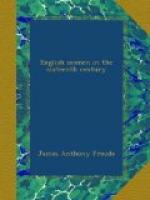Philip was weary of it too. He had enough to do in ruling his own dominions without quarrelling for ever with his sister-in-law. He had seen that she had subjects, few or many, who, if he struck, would strike back again. English money and English volunteers were keeping alive the war in the Netherlands. English privateers had plundered his gold ships, destroyed his commerce, and burnt his West Indian cities—all this in the interests of the Pope, who gave him fine words in plenty, but who, when called on for money to help in the English conquest, only flung about his dinner-plates. The Duke of Alva, while he was alive, and the Prince of Parma, who commanded in the Netherlands in Alva’s place, advised peace if peace could be had on reasonable terms. If Elizabeth would consent to withdraw her help from the Netherlands, and would allow the English Catholics the tacit toleration with which her reign had begun, they were of opinion, and Philip was of opinion too, that it would be better to forgive Drake and St. Domingo, abandon Mary Stuart and the seminary priests, and meddle no more with English internal politics.
Tired with a condition which was neither war nor peace, tired with hanging traitors and the endless problem of her sister of Scotland, Elizabeth saw no reason for refusing offers which would leave her in peace for the rest of her own life. Philip, it was said, would restore the Mass in the churches in Holland. She might stipulate for such liberty of conscience to the Holland Protestants as she was herself willing to allow the English Catholics. She saw no reason why she should insist on a liberty of public worship which she had herself forbidden at home. She did not see why the Hollanders should be so precise about hearing Mass. She said she would rather hear a thousand Masses herself than have on her conscience the crimes committed for the Mass or against it. She would not have her realm in perpetual torment for Mr. Cecil’s brothers in Christ.




